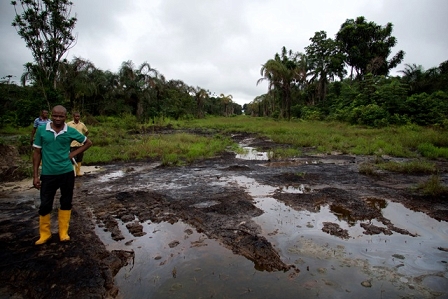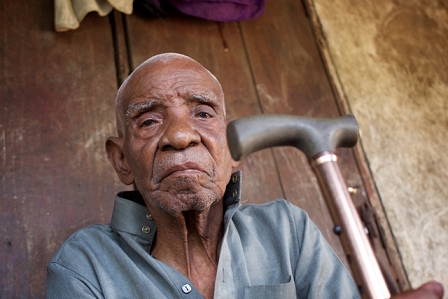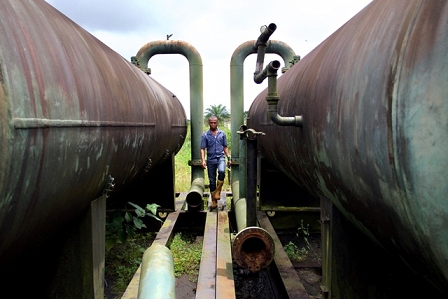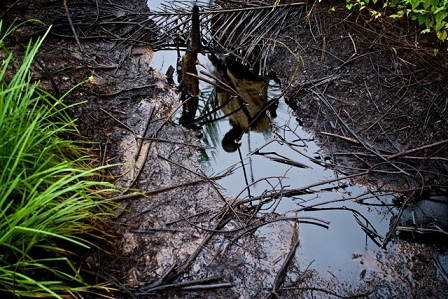Erstellt am: 3. 11. 2015 - 16:36 Uhr
The Curse of Oil in Africa
If you want to see how in Africa the ‘blessing’ of oil reserves have turned into a curse you only have to visit the Niger Delta, says Makmid Kamara.
The Amnesty International business and human rights researcher has spent weeks in the towns and villages of Africa’s biggest oil producing region this year, and was greeted with an unhealthy stench - the by-product of profits that have gone elsewhere.
Dieses Element ist nicht mehr verfügbar
“The smell of oil welcomes you to the community” he says. “In a community reliant on agriculture and fishing, the farmlands and fishponds are unused.”

Mike Uwemedimo for Amnesty International
The scenes described by Kamara sound like a science-fiction dystopia - but this is how Nigerians have been living for decades. “We saw soil soaked in oil. When we went to the creeks we saw the mangroves totally covered on oil. There are no living creatures there. Nothing is as it should be.”
This is, he says, because of the continuing pollution in the Delta caused by the oil industry in the Delta. The biggest player in the region is Shell, which operates 50 oil fields and 5,000km of pipelines. Amnesty describes these as often “ageing and poorly maintained.” Shell has admitted to 1,693 oil spills since 2007 but Amnesty says the number has probably been much higher.
"All our hopes have been dashed"
The lingering pollution has blighted life in the local communities, says Kamara: “the spills and pollution have ruined so many lives and livelihoods.” He and his team visited spill sites in Kegbara-Dere community in Gokana LGA Rivers State when Shell had claimed it had cleaned up previous oil spills:
“I met a man who said he has been full of hope when the oil company arrived promising to transform the community. Now he says all those hopes have been dashed. He can no longer farm or use the fish ponds. He can’t allow his children to play in the rivers like they used to. Even the water they drink is contaminated.”

© Mike Uwemedimo for Amnesty International
Environmental researchers have reported dangerous concentrations of benzene in community drinking water - sometimes 100 times the accepted safety limits - as well as other potentially carcinogenic pollutants. The Guardian has reported that life expectancy in its rural communities has fallen to little more than 40 years over the past two generations and many locals believe that polluted water plays a big role in that dismal statistic.
Ecological disasters have been a constant feature of Delta life for decades, but many had hoped that we would be 4 years into a period of environmental improvement by now. In 2011 the UN Environment Programme (Unep) released a hard-hitting report that said Shell and other oil firms systematically contaminated a 1,000 square km area of Ogoniland, in the Niger delta, with disastrous consequences for human health and wildlife.
Rusting Skeletons
The report grabbed the news headlines, there was some PR soul-searching and Shell promised to clean up the area. Yet Amnesty International, who released their new report today in partnership with the Centre for Environment, Human Rights and Development, says the oil giants have “manifestly failed” to do that.
Shell is no longer drilling in Ogoniland - production ceased in 1993 - but Amnesty says the company has failed to fully decommission its oil and the rusting skeletons have been vandalised and allowed to seep poison into the groundwater.

© Mike Uwemedimo for Amnesty International
Kamera’s team of researchers interviewed locals affected by the oil spill at Bomu Manifold in the eastern Niger Delta in 2009, including octogenarian Emadee Roberts Kpai, formerly a farmer and fisherman, who told them: “Our crops are no longer productive. No fish in the water. We plant the crops, they grow but the harvest is poor.
Amnesty says Shell “has not addressed problems with is entire approach to cleaning up oil pollution in Nigeria, including how it trains and overseas the local contractors that actually conduct the work.” Kamara says he has tried to confront Shell’s management with their allegations and has tried to organise the meetings but was just referred to their website which he says contains “misleading information.”
Amnesty International’s Makmid Kamara is calling in the Nigerian government to bolster to power of the body tasked with overseeing the clean-up - National Oil Spill Detection and Response Agency (NOSDRA) to give it more finances and powers to do its job properly. He wants to government to audit the past performance of NOSDRA “to ensure the sites are properly investigated and NOSDRA doesn’t just hand out certificates to companies as they demand them.”
He says that Shell should take meaningful action to implement its recommendations as passed down the United Nations in 2011 and should involve and inform local communities. “Very often Shell has said they have cleaned up local areas but no-one from the community has ever seen them. We need trust.”

© Mike Uwemedimo for Amnesty International
The fight for environmental justice in the Niger Delta was once led by the writer and poet Ken Saro-Wiwa, who was executed by the Nigerian state alongside eight Ogoni community leaders. The 20th anniversary of that state killing, which Amnesty International described at the time as “politically motivated and grossly unfair,” is on the 10th November. Kamera says it would be an appropriate way to honour his life by pushing now for justice in the struggle so dear to the writer’s heart.
“The writer cannot be a mere storyteller; he cannot be a mere teacher; he cannot merely X-ray society’s weaknesses, its ills, its perils. He or she must be actively involved shaping its present and its future.” - Ken Saro-Wiwa


